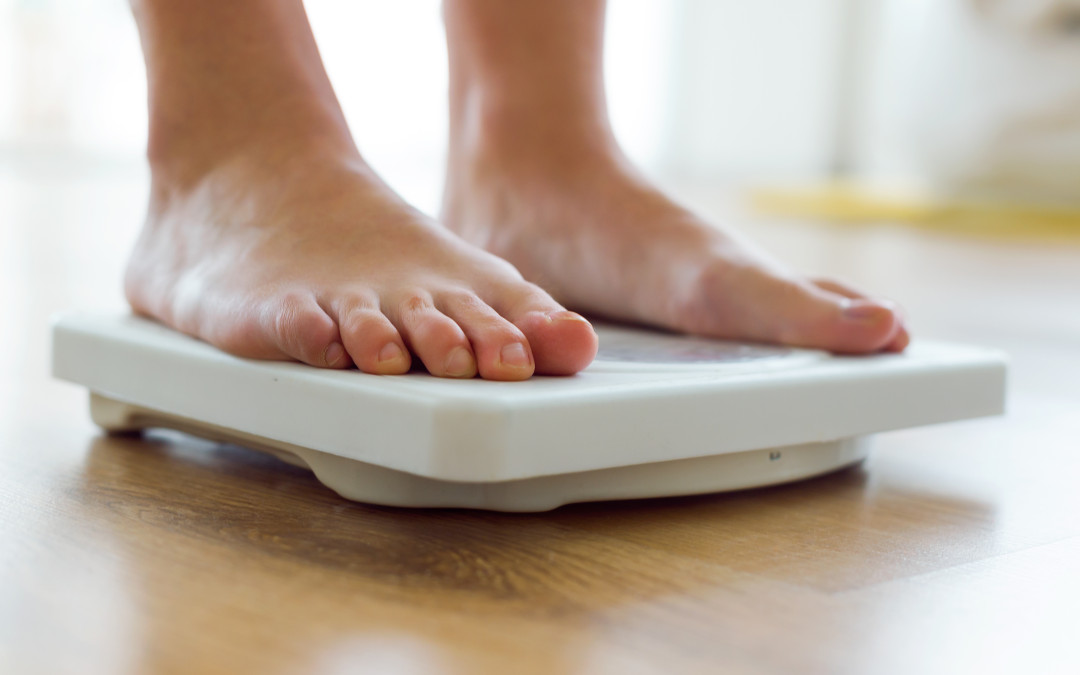Tell me if this sounds familiar:
You have been working hard to lose weight, busting your butt at the gym and eating to support your goals. You wake up feeling strong; your clothes are fitting better; and as you spy yourself in the mirror, you think, “My hard work is showing.”
Then you step on the scale and it shows that you’ve gained 2 pounds. Immediately, you feel deflated, defeated and as you pass the same mirror, you now see yourself differently. You start to second-guess what you’re doing and wonder if it’s even worth it. All your good feelings have been erased in a matter of seconds.
Why do we give so much power to an inanimate object that only gives us information about our relationship to gravity?
Often, we like the scale because it’s objective. It can’t deceive us. It gives us concrete, impartial data. But does it really?
There are several reasons why scale weight varies from day to day, most of which have to do with fluid shifts. More or less carbohydrate or sodium intake as well as hormones will influence how much fluid our body holds at any given time. So the day-to-day changes we see on the scale are not always true reflections of success or failure. Also, a scale can only measure weight, not body composition.
So if we decide to ditch the scale, what can we use? Let’s check out some alternate measures:
1) Measurements
As with the scale, a measuring tape also gives you objective data and is less influenced by shifting fluid. Here is a good guide to taking your measurements. Keep track of these periodically.
2) Body Fat Percentage
Many home scales now also measure body fat percentage. It’s important to recognize that these scales only measure body fat in a portion of your body. For a standing scale, the accuracy is questionable, as it will only measure body fat in your lower body. These types of scales are also influenced by hydration status, but they can still help you notice trends in your body fat.
If you want to get a true reading of your total body fat, search for a DXA scan or a hydrostatic weighing service in your area as these remain the gold standards. Though these measures are not always convenient and may have a cost associated, the accuracy tends to be worth the investment.
3) How Your Clothes Fit
Yes, this is a real measure of success. If you think about it, isn’t this really what we’re striving for when losing weight? To look and feel better? Finding an outfit or item of clothing you can use as a benchmark can help you keep track of your progress. Fitting better in your clothes is a sign you’re losing inches.
4) Strength and Endurance
Setting goals for and measuring improvements in your performance not only provide data on your progress, but also shifts the focus for exercise. Exercising strictly for weight loss can often turn it into a punishment. Also, when you don’t see the results on the scale, motivation for exercise can quickly diminish.
Focus instead on what your body can do. Can you now hold a plank longer, lift heavier weights, run the same distance in shorter time or walk up a flight of stairs without getting winded? That’s progress!
5) Energy Levels
This one is certainly less objective, but important nonetheless. Eating high quality foods full of vital nutrients, being physically active, and getting good sleep will improve your energy levels. Observe how different foods make you feel. If you start to tune in, you might notice those cookies at 2pm drain your energy, but a wholesome snack of fruit and nuts sustain you through the afternoon. Use these observations as motivation for your behaviors.
The bottom line is there are many ways to measure your success. Limiting yourself to just one metric, especially the scale, doesn’t give you a full picture of where you’re headed. If you decide to keep weighing, do so once a week at the same time and consider one or two of the above alternates to more accurately assess your progress.
Be well!
For a complimentary phone consultation with one of our Registered Dietitians, simply pick a time slot here.
This post was written by Danielle Heuseveldt


What To Eat Before & After Your Workouts
Enter your email for FREE access to the exclusive resource.
You have Successfully Subscribed!
100% privacy. No spam.